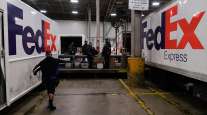UPS Gives Up on TNT Merger, Turns Attention to Other Deals
This story appears in the Jan. 21 print edition of Transport Topics.
Flush with a $9 billion stockpile after abandoning their $6.8 billion acquisition of TNT NV last week, UPS Inc. officials said they are evaluating other acquisitions consistent with their long-term growth strategy.
Purchase of the Dutch package and freight carrier, which would have been UPS’ biggest deal ever, was scrapped after European Commission staff signaled it would be rejected.
UPS’ 10-month effort to expand its global reach by purchasing TNT included three unsuccessful attempts to satisfy competitive concerns raised by the EC.
“Looking ahead, our company focus will be on the continued execution of our growth strategy,” CEO Scott Davis said in a statement. “Our financial strength allows UPS to capture future opportunities.”
Some of the next steps remain the subject of speculation, while others are expected to be disclosed later this month when UPS reports earnings on Jan. 31. UPS will announce then what it will do with the funds accumulated to pay for the acquisition, spokeswoman Peggy Gardner told Transport Topics.
The one thing it will have to do is shell out a quarter of a billion dollars related to the failed deal. Once the European regulatory agency issues its formal decision, UPS will be obliged to pay approximately $256 million (200 million euros) to TNT for a so-called breakup fee.
The deal would have furthered that goal by lowering UPS’ non-U.S. revenue to 64% from 74%. In addition, UPS and TNT combined would have matched Deutsche Post AG’s DHL as Europe’s largest package express operator (3-26, p. 1).
Asked why UPS agreed to a breakup fee when an EC rejection was possible, Gardner said such clauses were “fairly standard” in mergers and were “relatively minor” in comparison to the acquisition price.
UPS had $9 billion in cash and marketable securities at the end of the third quarter, according to a regulatory filing.
Raymond James analyst Art Hatfield said he believes UPS could boost share repurchases because it has $4.2 billion remaining under its current buyback program. His Jan. 14 report noted that UPS could buy back $2 billion or more of its shares after scaling back its repurchase program last year to accumulate cash to make the TNT purchase.
Hatfield also said dividend increases, debt reduction payments or refinancing were possible financial moves.Analyst Nate Brochmann of William Blair & Co. said, “The company will continue to pursue the strategic opportunities that were identified through the deal, particularly those within Europe and Asia.”
BB&T Capital Markets analyst Thom Albrecht said the focus would be on fast-growing overseas markets such as shipments within China that are growing more than 20% annually.
But overall, Gardner said, Atlanta-based UPS is continuing on a course laid out at a 2011 investor meeting where the company identified growth in international markets as the key to future expansion. Annual international profit growth of up to 15% was targeted at the meeting (9-19-11, p. 3).
That focus has boosted profit from UPS’ international activities to 40% today from just 6% in 2000.
Other speculation focused on what rivals would do, particularly FedEx Corp.
“I wouldn’t rule out that FedEx is potentially interested,” said Beat Keiser, a Zurich-based analyst for Credit Agricole.
And Andre Mulder of Kepler Capital in Amsterdam agreed FedEx is a likely bidder for TNT because DHL would likely receive the same reception as UPS from the EC.
FedEx spokesman Jess Bunn told TT that “as a matter of policy, we do not comment on corporate development matters.”
But others don’t see FedEx — which has said it plans to focus on organic growth in Europe — as a TNT suitor.
BB&T’s Albrecht said FedEx won’t pursue TNT because the U.S. company “saw how UPS was treated by the EC” and because it’s focused now on an internal restructuring program that will require high capital levels in the future.
TNT’s future may also be uncertain.
Dutch postal operator TNT Post, which owns 30% of TNT shares, is considering selling the stake retained when TNT Express was created and spun off to shareholders in 2011.
PostNL CEO Herna Verhagen told Bloomberg News, “We expect that we will monetize the stake over the medium term to create better value for shareholders, after we have seen stability return to TNT Express.”
Meanwhile, TNT has the advantage of operating with no debt on its books. However, it lost about $135 million from operations in 2011 on revenue of about $10 billion, and losses continued through the first three quarters of 2012.
Europe generates about 60% of TNT’s revenue, where the company has shown annual operating profits; but operations in Asia and the Americas have been losing money. The Americas account for about 6% of TNT revenue.
TNT spokesman Cyrille Gibot told Bloomberg News on Jan. 14 that the breakup fee it expects from UPS would likely be used to shore up its balance sheet rather than paying a special dividend.




